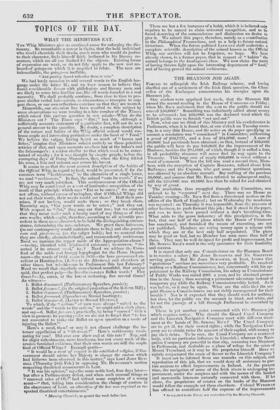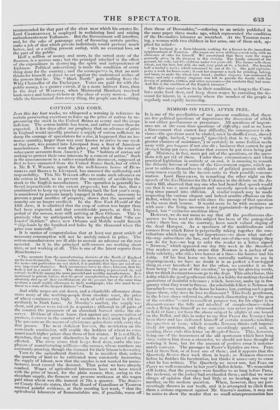THE SHANNON JOB AGAIN.
FORCED to relinquish the Irish Railway scheme, and having . shuffled out of a settlement of the Irish Bank question, the Chan- cellor of the Exchequer concentrates his energies upon the . Shannon job.
Our readers were apprized last week, that the Shannon Bill passed the second reading in the House of (immons on Friday ; when Air. them undertook that the cost to the public should not exceed 250,0001.* Something was indistinctly added about money to be advanced ; but 250,0007. was the declared total which the British public were to furnish " out and out."
Now, what can we think of this Minister and his confederates in Parliament, when it is found that, at one o'clock on Tuesday morn- ing, in a very thin House, and the notice on the paper specifying no amount, a resolution was " considered" in Committee, authorizing a grant of 290,7171., and a loan of 294,090/. more! A sum of 50,000/. had previously been obtained ; so that, instead of 250,0001. the public will have to pay 340,0001. for the improvement of the Shannon, besides the 294,09010 of which, though it is called a loan, in all probability sixpence will never find its way again to the Treasury. This large sum of nearly 600,0001. is voted without a word of comment. When the bill was read a second time, Ment- • hers, with the exception of Captain Bosanto, talked about Irish Railways ; and the Captain, who put some pertinent questions, was silenced by an absolute untruth. Say nothing of the previous 50,0001., and assume that Mr. then referred to subsequent outlay, still the 250,0001. was 40,0001. less than he asked for and obtained • by way of grant. The resolution, thus smuggled through the Committee, was ordered to be "reported" next day. There was no House on Tuesday evening—Mr. Ries fled from a threatened motion on the . affairs of the Bank of England ; but on Wednesday the resolution was reported : on Thursday it was impossible, from the pressure of other business, to push forward this job ; but it stood in the paper, and was to have been passed without a day's breathing-time. What adds to the gross indecency of this precipitation, is the •• Iltct, that one half of the plans which the /louse of Commons j. has sanctioned, and furnished the means of' executing, are not yet published. Members are voting money upon a scheme with which they are at the best only half acquainted. The plans may be good or bud, but no Member has seen more than half of them. They may be well designed for profit and improvement, but Mr. SPRING RICE'S word is the only guarantee for their feasibility and success.
It is stated that only one Commissioner on the Shannon Board is to receive a sabre • Sir Joni litoloorNit and Mr. GRIFFITHS serving gratis. But 'Sir JOHN Beacorsa, at least, knows that "gratuitous" services are sometimes very profitable. lie received nothing as a Railway Commissioner, but, concurrently with his ap- pointment to the Railway Commission, his salary as Commissioner of Public Works was raised 2001. a year, and he obtained promo- tion in the Army ; thus securing a permanent advantage instead of temporary pay while the Railway (.'ommissionership lasted. As it was before, so it may be again. What are the odds that the un- paid Shannon Commissioners arc not richly recompensed for their trouble ? Nor is it expected that they should work fbr nothing; but then, let the public see the account in black and white, and let not the passage of a bill through Parliament be smoothed by deceit.
There is yet another point connected with this Shannon jolt which requires notice. Why should the Grand Canal Company and the Limerick Navigation Company meet with different treat- ment at the hands of Mr. SPRING RICE ? The Canal Company are to get 51. for their vested rights ; • while the Navigation Com- pany are to obtain twice the amount of their capital, with money to pay their debts. To be sure, the Canal Company arc a scattered body, with no particular influence in Limerick ; whereas the Navi- gation Company are powerful in that city, returning two Members to Parliament, and desirable as a place of refuge for the scion of Mount Trenchard, or it may be the proprietor himself. Have we rightly conjectured the cause of favour to the Limerick Company ? it must not be inferred from our remarks on this subject, and reprobation of this job, that we would deny all assistance to par- ties anxious to effect improvements in Ireland. At the present time, the navigation of some of the Irish rivers is undergoing hn- provement, under the auspices and with the means of the landed and mercantile interests naturally connected with them. If let alone, the proprietors of estates on the banks of the Shannon would follow the example set them elsewhere. Colonel WYNDHAM has offered to contribute. half the expense of the improvements * So reported in the Tines; not contradicted by the Morning Chronicle.
recommended for that part of the river near which his estates lie. Lord CHARLEVILLE is employed in reclaiming land and raising embankments near Tullamore. But the Government will interfere, and, for the sake of patronage and of favouring certain parties, make a job of that which private individuals would perform much better, and at a trifling present outlay, with no eventual loss, oft the part of the public. Half a million of money and more, in the actual state of the finances, is a serious sum; but the principal mischief is the effect of the expenditure in destroying the spirit and independence of Irishmen. Political subserviency is made the condition of every thing clone for the country ; and the consequence is, that no man thinks for himself', or dares to act against the understood wishes of the powers that be. The " black North" gets nothing from the Whig Chancellor of the Exchequer. Votes are paid for with the public money, to a greater extent, it in a more indirect form, than in the days of WALPOLE, when Ministerial Members received bank-notes and lottery-tickets at the close of every session. And while the Government does, every thing, the people can do nothing.



























 Previous page
Previous page